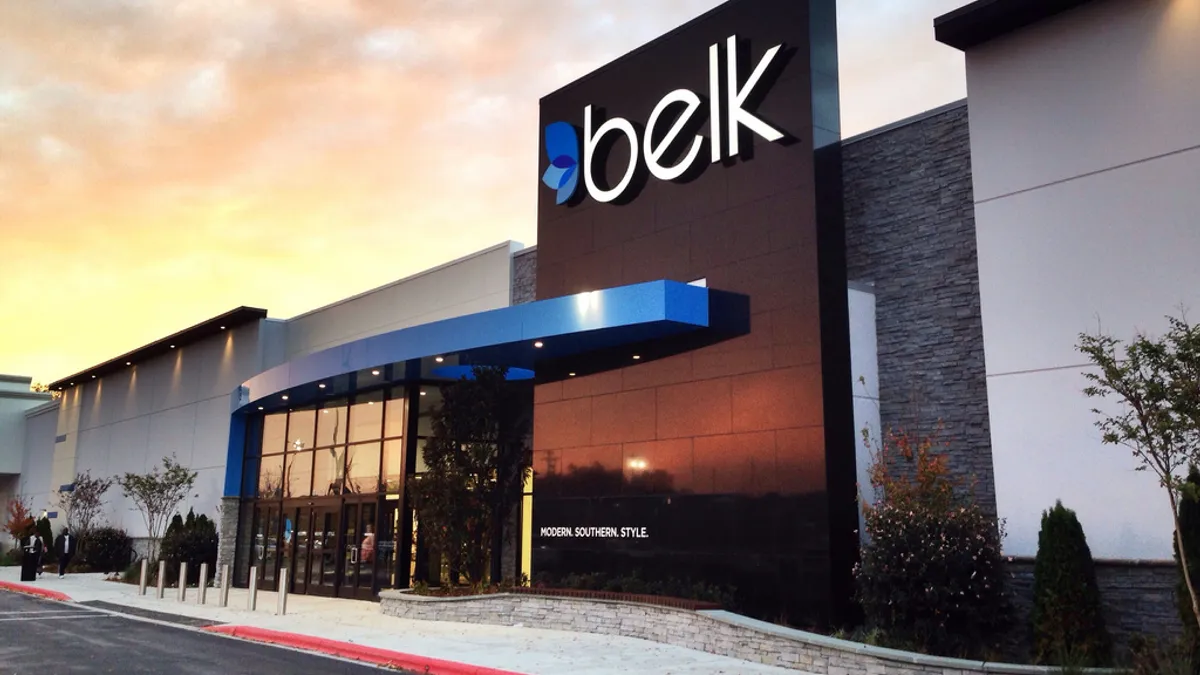North Carolina-based department store chain Belk enjoys icon status in the Southern states where it's mostly thrived for over 130 years. For a brand transformation announced on Wednesday, however, the company is turning to the New York office of advertising agency Mcgarrybowen, which is much closer to the Manhattan headquarters of its private equity owner Sycamore Partners than to its own in Charlotte.
It's the latest consequence of the Belk family's sale of the business in 2015 for $3 billion, a steep price and a savvy move, according to many observers at the time, in light of the challenges faced by retailers, especially department stores. Mcgarrybowen will help Belk forge new brand positioning, brand identity and a brand campaign, according to Belk Chief Customer Officer Julie Cary. "It will look very different, it’ll be very bold," she told Retail Dive in an interview, adding that the specifics are yet to be worked out and won't be revealed until the New Year. "But it will stay true to what customers love about Belk."
Of course, that's the challenge in a nutshell — how to build a new brand without alienating loyal followers. While analysts observe that Belk's fans are mostly older shoppers, they remain fiercely loyal to a retailer that since its founding in 1888 has been closely connected to the communities where it operates. "Belk is a company that has had a long history of strong brand loyalty in the South," retail analyst Nick Egelanian, president of retail development firm Siteworks, told Retail Dive in an interview. "I think their customers will remain loyal — but they’re not growing their customer base."
"It will look very different, it’ll be very bold ... But it will stay true to what customers love about Belk."

Julie Cary
Chief Customer Officer, Belk
Belk runs nearly 300 stores across 16 states — Alabama, Arkansas, Florida, Georgia, Kentucky, Louisiana, Maryland, Mississippi, Missouri, North Carolina, Oklahoma, South Carolina, Tennessee, Texas, Virginia and West Virginia, according to a company press release emailed to Retail Dive. About half are in malls, and about half operate in just three of those states, North Carolina, Georgia and South Carolina, according to an October 2018 report from Moody's Investors Service that was emailed to Retail Dive.
"A lot are smaller stores in smaller towns and there's a lot of loyalty in those stores. That part of their fleet is more like Kohl’s and those stores have relevancy," Egelanian. "But those stores are under the same assault as the others. If a TJ Maxx or a Home Goods opens nearby, I don’t see a happy ending here. For all these department stores, those that can come up with higher-end merchandising mix in the better malls have a chance, but it's a really tough battle."
The company does many things right. Its private and exclusive apparel labels and a new proprietary beauty line differentiate its merchandise, for example. But anecdotal reports from customers indicate they have noticed some Belk stores in disarray lately. That could be a consequence of layoffs in recent months. Last year the company eliminated dozens of assistant store manager, operations manager and sales team manager positions in Belk stores across all 16 states, according to the Charlotte Observer.
"It’s another chapter in a continuing saga of legacy retailers that started with a vision and purpose and committed owners who were very involved in community, were very hands-on in the store, knew who their customer was — both figuratively and often literally, and built their business around the communities they were in," retail analyst Sanford Stein, author of "Retail Schmetail," told Retail Dive in an interview. "They’ve cut an expense and overhead but also what’s necessary to make these spaces human. What is left for too many is they’re over-merchandised, they’re crowded, they’re poorly displayed, you can’t find anybody to take your money and you certainly can't find anybody to guide your choices. It’s just product on top of product and nobody’s folded in months."
Belk spokesperson Tyler Hampton, however, said the company is making a $100 million investment over the next three years to spiff up stores, including the addition of open-sell shoe displays and new beauty layouts. The money will also go to "customer-facing opportunities and touchpoints," as well as expanding mobile and omnichannel, including more store fulfillment. Plus, unsurprisingly, to grow digital sales, Cary noted. "Given the transformative nature of retail and pace of change right now, we see a huge opportunity online," she said. "We have a great runway there."
That all, again, sounds like Kohl's. Such comparisons are no accident, as the company shifted some stores to that department store-lite model years ago, according to Brian Kelly, president of brand strategy firm Brian Brands. But its more rural, small-town locations are a challenge, in part because those populations are suffering financially despite a good economy, he said.
"For Belk, it's the rural market layer of complexity. The store portfolio is full of small-market stores," he told Retail Dive in an email, adding that it takes a lot of data and supply chain sophistication to merchandise and market locally in such locations. "Belk's is this quarter's Shopko. 300 stores in 16 states. Big concentrations of stores in the Carolinas and Georgia. Is that enough of a different world that a clever digital play will make them relevant? If so, wouldn't [Kohl's CEO Michelle] Gass be there by now? I don't think the play exists. I think rural America is under water."
"They are toast. ... Like Shopko, the debt will make the crazy store portfolio a major liability."

Brian Kelly
President, Brian Brands
But Belk's footprint is expanding, according to Cary. Since 2017 three new stores have opened, and Belk has plans for a new store in Mansfield, Texas. "Where there are opportunities for growth, we will capitalize on that," she said.
If that's true, and if New York seems like a land of opportunity beyond where to find an ad agency, the company could expand north of the Mason-Dixon line, now that Lord & Taylor is potentially for sale, according to Mark Cohen, director of retail studies at Columbia University's Graduate School of Business. "Will [Lord & Taylor] come up with a buyer? Who knows," he told Retail Dive in an interview. "Could be the group that owns Belk — which is Sycamore — could theoretically look to consolidate. If they did it, they’d likely be able to do it on the cheap."
But cheap could still be costly, and all experts speaking for this story were skeptical of Belk's prospects under its private equity owner.
"All of these highly leveraged deals are more or less on a death watch," Cohen said. "J. Crew, Neiman Marcus, Belk. In a rising tide era, retailers, through growth and cash flow, can handle piles of debt. But in a disruptive era, which we’re in now, it’s a different story."
The company's private equity ownership has added debt to a total that now stands at $1.6 billion due in 2020, according to a Pitchbook report emailed to Retail Dive. "They are toast," Kelly warned. "Like Shopko, the debt will make the crazy store portfolio a major liability."
"It’s an obsolete format. If that’s what every data point’s telling you, and if you’re not seeing that, even the best rebranding isn't going to help you."

Nick Egelanian
President, Siteworks
It also doesn’t help that the family is no longer there to lead, according to Egelanian. Tim Belk, a member of the third generation of the founding Belk family, retired as CEO in 2016 after 12 years; his brother, Johnny Belk, by then had already left his job as chief operating officer.
"Even those that still have family leadership or ownership, like Nordstrom and Dillards — they’re not growing, they’re contracting," Egelanian said. "I have heard anecdotally that [Belk is] not run as well as they were when the Belk family was still in charge. These things don’t show themselves as massive problems in the stores — they show themselves in the lack of sharpness in the merchandising. The sweater pile that used to be re-sorted more often. In the heyday of the Belk chain — and Dillards and Nordstrom — these stores looked sharp. It was like it was set for you."
That makes the brand transformation announcement, especially with its dearth of detail or motivation, somewhat meaningless, he also said. "I don’t think there’s any particularly bad message in anything Belk said — it's just that the lack of vision is bad," he said. "It’s an obsolete format. If that’s what every data point’s telling you, and if you’re not seeing that, even the best rebranding isn't going to help you."























